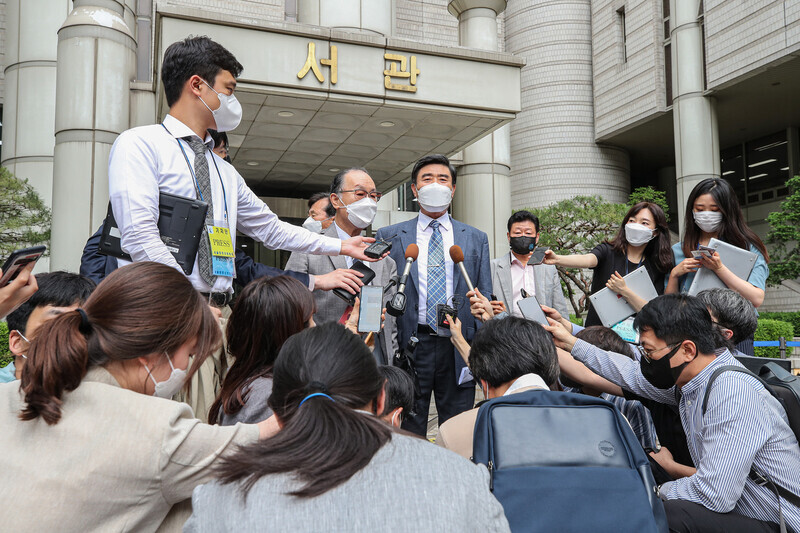hankyoreh
Links to other country sites 다른 나라 사이트 링크
[Editorial] Court dismissal of lawsuit against Japanese firms delegitimizes Supreme Court, victims’ sufferings

A South Korean court has ruled that victims of forced labor during Japan’s colonial rule over the country can’t file lawsuits against the Japanese companies that wronged them.
The Seoul Central District Court dismissed a damages lawsuit Monday that 85 forced labor victims and their family members filed against 16 Japanese companies. That ruling flies in the face of the Supreme Court’s en banc ruling in 2018 that found Japanese companies responsible for compensating those victims. It’s disturbing to see such a bewildering ruling in a lawsuit that represented the largest number of forced labor victims so far.
The court concluded that forced labor victims fall under the 1965 agreement in which the South Korean government gave up its right to make claims against Japan in exchange for financial support from Japan, given the language and circumstances of that agreement.
But South Korea’s Supreme Court has ruled that damage resulting from the illegal behavior of labor conscription is not subject to the 1965 agreement because the illegality of Japan’s colonial rule was neither mentioned in the text of the agreement nor in the process that led to its signing.
Of course, a lower court is allowed to make a ruling that conflicts with Supreme Court precedent. But for such a ruling to be meaningful, it must address newly revealed issues of injustice or account for changes in the zeitgeist, including public attitudes toward the law.
Nor is there any unique jurisprudence in this ruling, which the court itself admits is “in the end identical to the minority opinion in the Supreme Court’s en banc ruling in 2018.”
Thus, a district court has used a non-novel argument to reject jurisprudence that the full bench of the Supreme Court repeatedly confirmed three years ago. All that does is sow legal confusion and delay the remedy for the victims.
The Supreme Court’s ruling three years ago was itself lamented for taking far too long, coming as it did a full 13 years and eight months after the victims filed the lawsuit.
The Park Geun-hye administration made a deal with then Chief Justice Yang Seung-tae for the Supreme Court to overturn the plaintiffs’ victory in a lower court in 2012. That turned out to be a touchstone case in a major scandal about corruption in the courts.
The court has rubbed salt in the wounds of forced labor victims by once again thwarting their lawsuit.
The court also abruptly rescheduled its verdict from the original date of Thursday to Monday “in light of various circumstances, including the peace and stability of the courtroom.” That doesn’t demonstrate respect for the parties in the trial.
This is the second controversial ruling in recent months that challenges the forced labor victims’ earlier victory in damages lawsuits against the Japanese government. We’re concerned that these rulings will have a negative impact on confidence in the judiciary. Both of them ought to be quickly rectified on appeal.
Please direct comments or questions to [english@hani.co.kr]

Editorial・opinion
![[Editorial] Yoon must halt procurement of SM-3 interceptor missiles [Editorial] Yoon must halt procurement of SM-3 interceptor missiles](https://flexible.img.hani.co.kr/flexible/normal/500/300/imgdb/child/2024/0501/17145495551605_1717145495195344.jpg) [Editorial] Yoon must halt procurement of SM-3 interceptor missiles
[Editorial] Yoon must halt procurement of SM-3 interceptor missiles![[Guest essay] Maybe Korea’s rapid population decline is an opportunity, not a crisis [Guest essay] Maybe Korea’s rapid population decline is an opportunity, not a crisis](https://flexible.img.hani.co.kr/flexible/normal/500/300/imgdb/original/2024/0430/9417144634983596.jpg) [Guest essay] Maybe Korea’s rapid population decline is an opportunity, not a crisis
[Guest essay] Maybe Korea’s rapid population decline is an opportunity, not a crisis- [Column] Can Yoon steer diplomacy with Russia, China back on track?
- [Column] Season 2 of special prosecutor probe may be coming to Korea soon
- [Column] Park Geun-hye déjà vu in Yoon Suk-yeol
- [Editorial] New weight of N. Korea’s nuclear threats makes dialogue all the more urgent
- [Guest essay] The real reason Korea’s new right wants to dub Rhee a founding father
- [Column] ‘Choson’: Is it time we start referring to N. Korea in its own terms?
- [Editorial] Japan’s rewriting of history with Korea has gone too far
- [Column] The president’s questionable capacity for dialogue
Most viewed articles
- 1Months and months of overdue wages are pushing migrant workers in Korea into debt
- 2At heart of West’s handwringing over Chinese ‘overcapacity,’ a battle to lead key future industries
- 3[Editorial] Yoon must halt procurement of SM-3 interceptor missiles
- 4Trump asks why US would defend Korea, hints at hiking Seoul’s defense cost burden
- 5Under conservative chief, Korea’s TRC brands teenage wartime massacre victims as traitors
- 6[Guest essay] Maybe Korea’s rapid population decline is an opportunity, not a crisis
- 7Fruitless Yoon-Lee summit inflames partisan tensions in Korea
- 81 in 3 S. Korean security experts support nuclear armament, CSIS finds
- 9[Column] For K-pop idols, is all love forbidden love?
- 10[Editorial] 10 years on, lessons of Sewol tragedy must never be forgotten